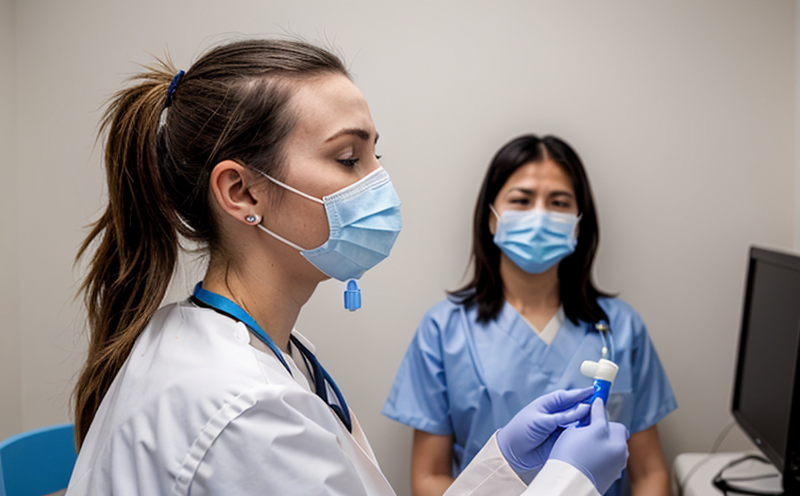Field Testing for Respiratory Pathogens in Swine Farms
The field testing of respiratory pathogens is crucial for the monitoring and control of infectious diseases that affect swine. Infections such as Pasteurella multocida, Actinobacillus pleuropneumoniae, and Rhonococcus equi can lead to significant economic losses in the pork production industry, including reduced growth rates, increased mortality, and higher veterinary costs. Field testing allows for rapid diagnosis of these pathogens, enabling early intervention measures that enhance animal health and welfare while minimizing financial impact.
The process involves collecting swab samples directly from affected animals or air samples within the farm environment using specialized sampling devices. These samples are then transported to a laboratory where they undergo rigorous analysis. The choice of test methods can vary widely depending on the specific pathogen suspected, but commonly used techniques include PCR (polymerase chain reaction), ELISA (enzyme-linked immunosorbent assay), and culture-based methods.
PCR tests offer high sensitivity and specificity for detecting viral or bacterial nucleic acids. They are particularly useful in identifying pathogens like Mycoplasma hyopneumoniae, which can cause chronic respiratory disease in swine. ELISA tests, on the other hand, provide a quick assessment of antibodies present against certain pathogens, helping to determine past exposure levels without requiring live cultures. Culture-based methods involve isolating and growing microorganisms from the sample, providing definitive identification but often taking longer compared to molecular techniques.
Field testing plays an essential role in identifying outbreaks early, allowing for targeted treatments such as antibiotics or vaccines. This proactive approach not only helps mitigate immediate health risks but also contributes to maintaining overall herd immunity within the farm population. By implementing regular field tests, producers can maintain higher standards of biosecurity and reduce the likelihood of disease spread both internally and externally.
The importance of accurate testing cannot be overstated when it comes to managing respiratory diseases in swine farms. Misdiagnosis or delayed diagnosis could result in prolonged illness among pigs, increased mortality rates, and substantial economic losses due to lost productivity. Therefore, investing in reliable field testing technologies is vital for ensuring the sustainability and profitability of pork farming operations.
For quality managers, compliance officers, R&D engineers, and procurement teams working with swine farms, understanding these aspects of respiratory pathogen testing can significantly improve decision-making processes related to biosecurity protocols, herd management practices, and supplier selection criteria. Leveraging advanced field testing methodologies ensures that farmers stay ahead of potential health threats faced by their livestock.
| Pathogen | Common Symptoms | Detection Method |
|---|---|---|
| Pasteurella multocida | Nasal discharge, lethargy, rapid breathing | PCR, ELISA, Culture-Based Methods |
| Actinobacillus pleuropneumoniae | Bilateral pneumonia, fever, difficulty breathing | PCR, ELISA, Culture-Based Methods |
| Rhonococcus equi | Respiratory distress, coughing, weight loss | PCR, ELISA, Culture-Based Methods |
| Date of Sample Collection | Type of Sample Collected | Testing Method Used |
|---|---|---|
| Day 10 Post-Symptoms Onset | Tracheal Swab | PCR |
| Day 20 Post-Symptoms Onset | Air Sampling | ELISA |
| Day 35 Post-Symptoms Onset | Nasal Swab | Culture-Based Methods |
- Pasteurella multocida: Causes swine pneumonic plague, commonly detected using PCR.
- Actinobacillus pleuropneumoniae: Responsible for pleuropneumonia in pigs, diagnosed through ELISA tests.
- Rhonococcus equi: Leads to respiratory disorders and septicemia; identified via culture-based methods.
Benefits
Implementing field testing for respiratory pathogens offers numerous advantages that benefit various stakeholders involved in swine farming:
- Informed Decision-Making: Early detection allows for prompt actions, reducing the spread of diseases and minimizing economic losses.
- Economic Efficiency: By preventing outbreaks and controlling existing infections effectively, farmers can save money on treatment costs and improve overall profitability.
- Biosecurity Improvement: Regular testing helps maintain strict biosecurity measures by identifying weak points in the system early on.
- Animal Welfare: Prompt intervention ensures better health outcomes for pigs, reducing stress and improving their quality of life.
The implementation of field testing not only supports sustainable practices but also contributes to global food safety initiatives aimed at producing safe, high-quality pork products.
Industry Applications
Field testing for respiratory pathogens finds application across multiple sectors within the swine industry:
| Sector | Application |
|---|---|
| Pork Production Farms | Monitoring and controlling infectious diseases affecting pig populations. |
| Research Institutions | Studying the prevalence and impact of respiratory pathogens in different environments. |
| Veterinary Clinics | Providing diagnostic services for swine farmers seeking guidance on health issues. |
| Pharmaceutical Companies | Developing and testing new vaccines and treatments specifically designed against respiratory pathogens.
A list of specific pathogens tested in field studies includes:
- Pasteurella multocida
- Actinobacillus pleuropneumoniae
- Rhonococcus equi
- Mycoplasma hyopneumoniae
The results of these tests play a critical role in shaping policies and practices aimed at enhancing swine health worldwide.
Why Choose This Test
Selecting the appropriate field test for respiratory pathogens is paramount to achieving accurate diagnoses and effective management strategies. Here are several reasons why choosing this particular testing method makes sense:
- High Accuracy: Utilizing advanced PCR technology ensures precise identification of even minor quantities of pathogenic DNA, enhancing accuracy.
- Quick Results: Rapid test turnaround times enable quicker responses to emerging health concerns within the farm setting.
- Eco-Friendly: Minimized use of antibiotics and other chemicals reduces environmental impacts associated with conventional treatment approaches.
- User-Friendly: Designed for ease-of-use, these tests require minimal training for operators, making them accessible to non-specialist personnel.
The combination of these factors makes field testing an indispensable tool in maintaining robust swine health programs. Investing in such technologies demonstrates a commitment to best practices and long-term sustainability within the industry.





